| [1] Zeng W, Maciejewski JP, Chen G,et al. Limited heterogeneity of T cell receptor BV usage in aplastic anemia.J Clin Invest. 2001;108(5):765-773.[2] Huang YL,Huang SL,Bao R,et al. Zhongshan Daxue Xuebao: Yixue Kexue Ban. 2006;27 (2):161-164.黄永兰,黄绍良,包蓉,等. 再生障碍性贫血儿童TCR Vβ亚家族T细胞克隆性增殖及其与HLA-DRB1*15的关系[J].中山大学学报:医学科学版,2006,27 (2):161-164.[3] Huang YL,Huang SL,Wei J,et al. Zhonghua Xueyexue Zazhi. 2006;27(2):129-130.黄永兰,黄绍良,魏菁,等. 再生障碍性贫血患儿骨髓造血干/祖细胞缺陷与细胞免疫功能异常的关系[J].中华血液学杂志,2006, 27(2):129-130.[4] Di Nicola M, Carlo-Stella C, Magni M,et al. Human bone marrow stromal cells suppress T-lymphocyte proliferation induced by cellular or nonspecific mitogenic stimuli. Blood. 2002;99(10):3838-3843.[5] Zhang W,Ge W,Li CH,et al. Zhongguo Mianyixue Zazhi. 2005; 21(3):168.张伟,葛薇,李长虹,等. 骨髓间充质干细胞通过分泌TGF-β1抑制T细胞的增殖[J].中国免疫学杂志,2005,21(3):168.[6] Altfeld M, Addo MM, Kreuzer KA,et al. T(H)1 to T(H)2 shift of cytokines in peripheral blood of HIV-infected patients is detectable by reverse transcriptase polymerase chain reaction but not by enzyme-linked immunosorbent assay under nonstimulated conditions. J Acquir Immune Defic Syndr. 2000;23(4):287-294.[7] Geissler K, Kabrna E, Kollars M,et al. Interleukin-10 inhibits in vitro hematopoietic suppression and production of interferon-gamma and tumor necrosis factor-alpha by peripheral blood mononuclear cells from patients with aplastic anemia. Hematol J. 2002;3(4):206-213.[8] Banchereau J, Briere F, Caux C,et al. Immunobiology of dendritic cells. Annu Rev Immunol. 2000;18:767-811.[9] Brilot F, Strowig T, Munz C. NK cells interactions with dendritic cells shape innate and adaptive immunity. Front Biosci. 2008; 13:6443-6454.[10] Xia Y, Dai J, Lu P,et al. Distinct effect of CD40 and TNF-signaling on the chemokine/chemokine receptor expression and function of the human monocyte-derived dendritic cells. Cell Mol Immunol. 2008;5(2):121-131.[11] Long EO. Ready for prime time: NK cell priming by dendritic cells. Immunity. 2007;26(4):385-387.[12] Nakao S, Feng X, Sugimori C. Immune pathophysiology of aplastic anemia. Int J Hematol. 2005;82(3):196-200.[13] Giannakoulas NC, Karakantza M, Theodorou GL,et al. Clinical relevance of balance between type 1 and type 2 immune responses of lymphocyte subpopulations in aplastic anaemia patients. Br J Haematol. 2004;124(1):97-105.[14] Schoenberger SP, Toes RE, van der Voort EI,et al. T-cell help for cytotoxic T lymphocytes is mediated by CD40-CD40L interactions. Nature. 1998;393(6684):480-483.[15] Hardin JA. Dendritic cells: potential triggers of autoimmunity and targets for therapy. Ann Rheum Dis. 2005;64 Suppl 4: iv86-90.[16] Rainsford E, Reen DJ. Interleukin 10, produced in abundance by human newborn T cells, may be the regulator of increased tolerance associated with cord blood stem cell transplantation. Br J Haematol. 2002;116(3):702-709.[17] Pang Y,Xiao Y,Jiang ZJ,et al. Guangdong Yixue. 2009;30(10): 1488-1490.庞妍,肖扬,蒋祖军,等.以树突状细胞为主的免疫细胞对慢性再生障碍性贫血患者外周血IFN-γ及TNF-α表达的影响[J].广东医学, 2009,30(10):1488-1490.[18] Devine SM, Hoffman R. Role of mesenchymal stem cells in hematopoietic stem cell transplantation. Curr Opin Hematol. 2000;7(6):358-363.[19] Rasmusson I, Ringdén O, Sundberg B,et al. Mesenchymal stem cells inhibit the formation of cytotoxic T lymphocytes, but not activated cytotoxic T lymphocytes or natural killer cells. Transplantation. 2003;76(8):1208-1213.[20] Bartholomew A, Sturgeon C, Siatskas M,et al. Mesenchymal stem cells suppress lymphocyte proliferation in vitro and prolong skin graft survival in vivo. Exp Hematol. 2002;30(1): 42-48. |
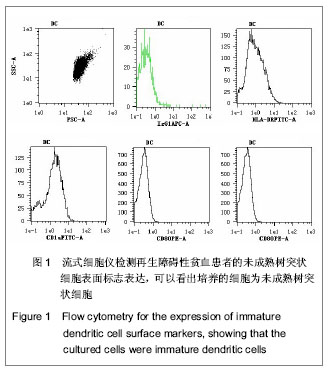
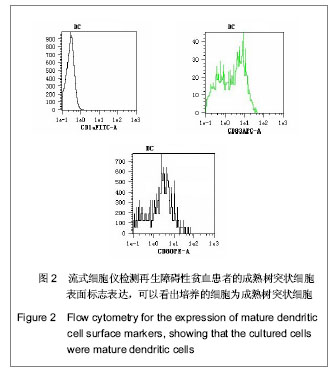
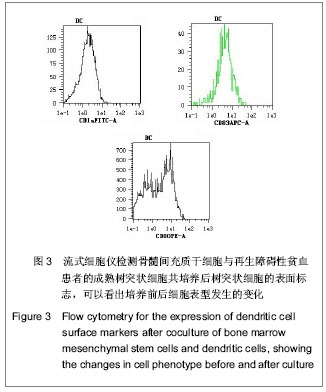
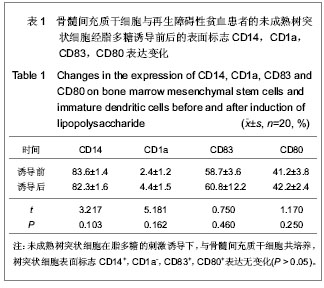
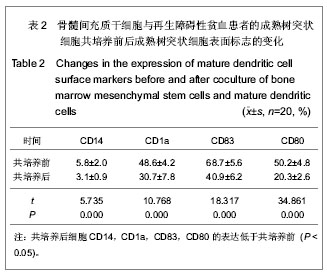
.jpg)